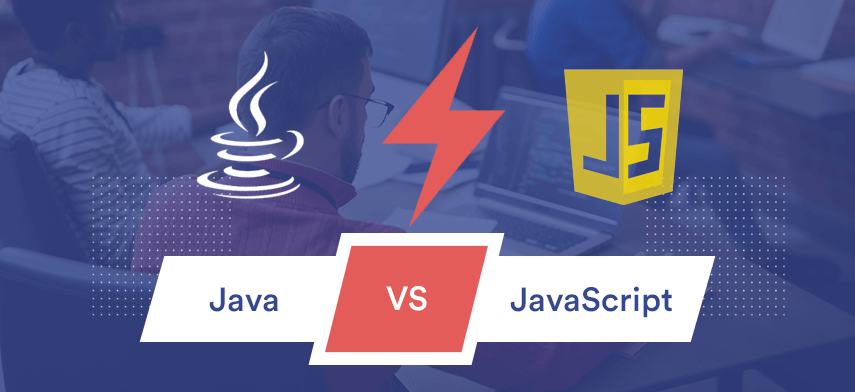Years passed, but the confusion between JavaScript and Java is still impacting business outcomes. Many assume JavaScript is an extension of Java, while others are skeptical about their choice as the former has the term ‘Java’ in it.

Indeed, Java and JavaScript crossed paths in their early development days. But they are entirely different. Both have created a niche in the software development landscape, and rule the world of programming in their separate roles.
Today’s Java vs JavaScript discussion is all about understanding the uniqueness of both programming languages and how they are different from each other. So, without further ado, let’s begin with Java vs Javascript which is better.
Table of Content
- All About Java
- All About JavaScript
- Major Similarities Between Java and JavaScript
- Java vs JavaScript: Understanding the Java and JavaScript Difference
- Java vs JavaScript: Which One to Choose?
All About Java
Java is a platform-independent, object-oriented programming (OOP) language. Applications developed with Java can run across multiple platforms. James Gosling developed it, in 1995, at Sun Microsystems (now acquired by Oracle).
Features of Java
- Follows OOP concepts like inheritance, abstraction, and encapsulation.
- Works on Write Once, Run Anywhere (WORA) theory.
- Uses a compiler to execute codes.
- Facilitates distributed computing.
- It is a multithreaded language with automatic memory management.
Advantages of Java
Java has been the foundation of various web-based, mobile, and enterprise applications. Here are some advantages that have made it the most preferred programming language in the community –
- Facilitates the creation of reusable code and modular programs.
- Programs written on one platform can be easily ported to another.
- Performs numerous tasks at the same time within a program.
- Verifies and detects errors before compiling, thus ensuring smooth run time.
- Avoids production complexities with dedicated exception handling and garbage collection.
- Offers network-centric capabilities to design and develop distributed computing systems.
- Provides various sets of commands, APIs, open-source tools, IDEs, etc., to simplify and speed up the app development process.
- Builds apps that can seamlessly run on any platform that has Java Virtual Machine (JVM).
Applications of Java
Java has proved its efficiency across multiple platforms. It has been the backbone of many industry sectors throughout the business world. Here are some major use cases of Java to give you a better idea.
- Considered standard programming language for Android app development.
- Preferred choice for building superior cross-platform software.
- Used to handle high-volume data processing enterprise systems.
- Supports many scientific computing applications, like MATLAB.
- Creates big data analytics-based solutions with ease.
- Found in embedded systems of vehicles, home appliances, and IoT devices.
- Used for server-side technologies like Apache Tomcat, JBoss, GlassFish, etc.
Java Development Tools
A plethora of development tools is available to write, test, and run Java codes. And here are the popular ones –
- NetBeans
- Eclipse
- Apache Maven
- IntelliJ Idea
- Visual Studio Code
Moving ahead with our Java vs JavaScript for web development discussion, we will now have a brief overview of JavaScript and what it brings to your table.
All About JavaScript
JavaScript (JS) is a lightweight scripting language that exploits a particular web browser to create dynamic and interactive web pages. It follows client-side programming standards and can easily work with adjacent technologies like REST APIs, XML, Node JS, and more.
Features of JavaScript
- Cross-platform and lightweight scripting language.
- Supports OOP concepts like polymorphism.
- Consists of dedicated client-side programming capabilities.
- Controls website content, depending on the users’ actions and inputs.
- Backed by a robust testing workflow and an interpreter to check scripts.
- Complements and easily integrates with Java.
Advantages of JavaScript
JavaScript is used to incorporate animations, interactive maps, and other dynamic content. Some significant benefits enabling designers and developers to rely on JavaScript are as follows.
- Facilitates files that are smaller and do not take a huge memory to execute.
- Generates a smaller number of server requests resulting in an enhanced user experience.
- Supports the storage and retrieval of information on the users’ devices.
- Easily works with technologies like HTML and CSS to create rich web interfaces.
- Complies with popular browsers like Google Chrome, Mozilla Firefox, Microsoft Edge, and others.
- Allows cross-compilation and supports modules, classes, and interfaces.
- Helps offer immediate feedback to visitors.
- Successfully runs on servers handling both front-end and back-end.
Applications of JavaScript
JavaScript is used for web-based applications that run on web browsers. But it also has applications beyond the web. Let’s take a look at a few of the use cases to understand its potential.
- Preferred language to create interactive web pages.
- Used to develop browser-based games and applications.
- Helps build mobile apps, web apps, SPAs, network apps, smartwatch apps, web servers, flying robots, and so on.
- It supports the development and deployment of web-based games.
- Specially designed for small scripts but can be extended for writing large and complex solutions.
- Supports product development with technologies like React, AngularJS, Ember.js, jQuery, etc.
- Compatibility with Node JS environments makes it an ideal choice for satisfying back-end requirements.
JavaScript Development Tools
JavaScript programming can be done with a simple text editor like Notepad. But to develop better apps, several sophisticated development tools with additional features have been designed. Some of them are –
- Visual Studio Code
- Sublime Text
- WebStorm

Java vs JavaScript: Major Similarities Between Java and JavaScript
Now that you know the basics, we can move forward with our Java vs JavaScript discussion and find out what’s common in both platforms. There is a difference between JavaScript and Java development, but they have some similarities in the underlying concepts and working style. Some of them are as follows.
Object-Oriented Programming
Both Java and JavaScript, require the programmer to code, following the concept of objects and their relationships to one another. Therefore, both languages support OOP concepts like classes, inheritance, abstraction, encapsulation, and polymorphism.
Web Browser Compatibility
JavaScript codes run on modern web browsers. They make websites interactive and dynamic. With JavaScript, browsers can perform form validations, calculations, and many other functions. Similarly, Java applications could also run on web browsers in the form of Applets. But modern browsers don’t support Applets anymore.
Server Application Development
Java has been used in server-side web applications to support the back-end of the websites. Java-based servers like Apache Tomcat, JBoss, and WebSphere have been working behind many public sites and internal corporate networks. Meanwhile, with the support of back-end technologies like Node.js, JavaScript has also begun powering server applications.
Libraries and Frameworks
Language libraries and frameworks provide program developers access to various reusable general and purpose-specific codes. By using them, developers can reduce development time significantly. Java, as well as JavaScript, has a range of libraries and frameworks available for reuse in a variety of scenarios.
Java vs JavaScript: Understanding the Java and JavaScript Difference
After knowing the similarities, it is time to understand the key differences between Java and JavaScript. This will help you discover the uniqueness and limitations of both programming languages.
Here is a quick comparison table highlighting how different is JavaScript from Java based on a few parameters.
| Basis Of Comparison | Java | JavaScript | |
|---|---|---|---|
| 01 | Language | Java is an object-oriented programming language. | JavaScript is an object-base scripting language. |
| 02 | Programming paradigm | Java strictly follows object-oriented programming concept. | JavaScript can be used as an object-oriented, procedural, or scripting program. |
| 03 | Objects | Object in Java are class-based. | Object in JavaScript are prototype-based. |
| 04 | Type checking | Java is static and strongly-typed language. | JavaScript is dynamic and weakly-typed language. |
| 05 | Variable definition | Variables and their types should be declared before using them in program. | Variables can be declared and types can be assigned at the time of execution. |
| 06 | Scope of variable | Java variables have a blocked based-scope. They are out of scope when the control comes out of a code-block. | JavaScript variables have a function-based scope. |
| 07 | Function overloading | A Java code can have two or more function with the same name to execute different task. | JavaScript doesn’t support function overloading. |
| 08 | Code execution | Java code is compiled into bytecode, which is then interpreted at the time of execution. | JavaScript is interpreted and executed by the browser. |
| 09 | Execution environment | Java code is compiled onto the server before executing it on the client platform. | JavaScript is interpreted by the client browser. |
| 10 | Execution platform | Java code is compiled and interpreted by the Java Virtual Machine (JVM) | JavaScript is interpreted within a web browser. |
| 11 | Threading | Java is multithreaded program. | JavaScript is single-threaded program. |
| 12 | Platform portability | Java code can be written once and ported on multiple platform. | JavaScript code vary with the execution platform. |
| 13 | Concurrency | Java has a thread-based approach to concurrency. | JavaScript has an event-based approach to concurrency. |
| 14 | Development tool | Java programs require a Java Development Kit. | JavaScript codes can be written in any simple text editor. |
| 15 | Memory usage | Java programs use more memory for running. | JavaScript programs are lightweight |
| 16 | File extension | .java | .js |
Now, let’s take a closer look at these and a few other parameters to understand the difference between Java and JavaScript in more detail.
Coding
Coding capabilities are a really important parameter to understanding what is the difference between Java and JavaScript in particular. Both languages are coded, assembled, and executed in different ways.
JavaScript code resides in the <script>…</script> tag in a web page or browser-based/mobile application. Put simply, JavaScript code is interpreted by web browsers. Whereas code written in Java is compiled and run on JVM.
Development Capabilities
Another considerable Java vs JavaScript comparison parameter is the development landscape. Java has found varied usage in Android application development, embedded computers, and enterprise applications. JavaScript, however, is popular as a tool to make the web browsing experience interactive for the user.
Java is used in a wide range of server-side applications. JavaScript, on the other hand, runs in the client-side web browser. However, in recent years, JavaScript has become extremely popular on the server side also with Node.js.
Popularity
Comparing Java vs JS on the basis of popularity gives insights into the credibility and availability of both programming languages.
According to the Stack Overflow Developer Survey 2022, JavaScript is recognized as the most commonly used programming language for ten years in a row. It is used by 67.9% of professional developers across the globe. The survey also states that Java is the 6th most commonly used programming language by 33.4% of experts worldwide.
Another research by StackShare says that 103K+ companies are using Java, while more than 144K enterprises rely on JavaScript for their software development requirements. These stats clearly depict the widespread popularity and adoption of both platforms.
Operating Systems
Difference in Java and JavaScript also highlights the fact of how each of these platforms approaches system software. Java is supported by almost all operating systems like Android, Linux, Windows, macOS, Unix, and more.
Similarly, you can use JavaScript across Android, iOS, Windows, and many other operating systems. However, the feature support is limited and demands the use of third-party tools and technologies.
Complexity and Learning Curve
Both languages are fairly easy to learn. It’s one of the reasons why they are extremely popular.
Standardization and Documentation
Our list of Java vs JavaScript difference parameters would be incomplete without mentioning standardization and documentation. It gives you insights into how accessible each of these platforms is.
Java is one of the best standardized and well-documented languages backed by good coding standards. But that’s not the case with JavaScript. Its ecosystem is continuously changing to explore various concepts and programming patterns.
Moreover, many frameworks built on top of JavaScript represent poorly maintained documentation and coding standards. This makes it more complex and less accessible to new developers.
Java vs JavaScript: Which One to Choose?
With all the above, you would have surely understood the different aspects of Java JavaScript difference and their importance in selecting the right programming language. Now, you need to choose the one that can help you achieve your business goals.
Both Java and JavaScript play a vital role in developing different types of complex applications, products, and digital solutions. They simplify the development process and reduce the time to market. They bring their own set of pros and cons to your table.
Many believe that the execution of Java applications is faster. But there are others who consider JavaScript as the go-to option for client-side execution. The former delivers seamless user experiences, while the latter ensures quick feedback and interactivity.
Altogether, we can say that there is no ultimate winner of this JS vs Java debate as they serve different purposes. Choosing Java or JavaScript totally depends on your project requirements and the type of product you want to develop.
Wrapping Up
This Java vs JavaScript comparison blog gives you a profound idea about the differences between both platforms and where they stand in today’s digital age. It explains how they have a few similarities but are totally unrelated and distinct.
Both have their advantages, which make them suitable for one development scenario or the other. While Java is extensive, faster, and improves the production environment, JavaScript is lighter, accessible, and maximizes interoperability. Now you know which is better java or javascript for web development, select the most suitable one. If you are still contemplating your choice or unable to select the programming language that can best suit your project, Mobisoft can end all your confusion once and for all. Connect with our experts or write to us at business@mobisoftinfotech.com and we will be more than happy to help you.

Author's Bio

Ravindra Waghmare is the Co-founder and COO at Mobisoft Infotech. He is an expert in solutioning, software consultancy, process definition and improvements, business analysis, and project execution. He has 11+ years of experience in software development,consulting, delivery, company operations, talent acquisition, processes and sales.


